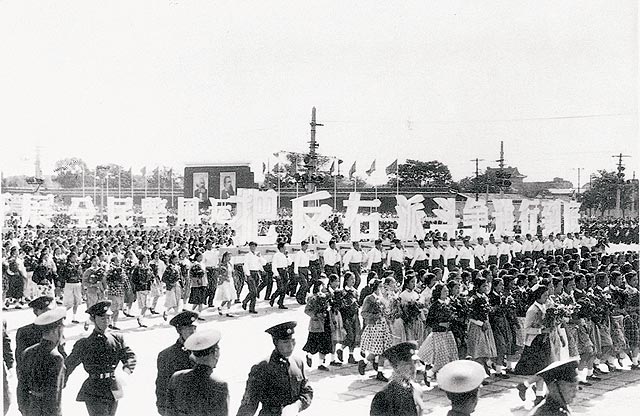CCP produces its gravediggers after abandoning Mao's ruling scheme

Wikipedia
Mao’s skills in securing his power are unrivaled. His major trick is the absolute control of intellectuals. Once intellectuals are under control, others can be fooled effortlessly.
During the Yan’an Rectification Movement that he started while watching the Nationalists fighting bloody battles against the invading Japanese, not only did he eliminate his major intellectual rivals within his own party such as Wang Ming, but also subdued the large group of young intellectuals who were fooled by the CCP’s propaganda, went to Yan’an, but soon became disillusioned with the CCP. The leader of this group, Wang Shiwei, was eventually executed, and his body was cut into pieces and buried in an abandoned well. Survived intellectuals largely lived in the cage set by Mao’s Yan'an Talks on Literature and Art for the rest of their lives.
When Mao sensed the disobedience of many intellectuals in the 1950s, he started the massive Anti-Rightist Movement that dwarfed the burning of the books and burying of the scholars by Qing Shi Huang. About 550,000 people mostly intellectuals were labeled as rightists. Many of those with a spine were sent to labor camps and died in the soon to come famine resulted from Mao’s Great Leap Forward Movement. Spineless ones became tamed tools of Mao’s regime. Even Qian Xuesen (Tsien, HS), the father of Chinese missiles, who studied and worked at Caltech, MIT, wrote an article to support the viability of absurd 10,000-jin field of Mao’s Great Leap Forward Movement that led almost 40 million people starved to death.
Mao had the final solution for intellectuals with his Great Proletarian Cultural Revolution. He first labeled them as Stinking Old Ninth (below the 8 other groups: bureaucrats, officials, Buddhist monks, Taoist priests, physicians, workers, hunters, prostitutes; above beggars), then uprooted the potential source of independent thinking by closing all colleges. Later, he opened colleges only to so called worker-peasant-soldier students whose loyalty to him was guaranteed. Even high school graduates did not escape his hands. He sent them to the countryside for so called reeducation by peasants so they would lose any potential of challenging his iron rule.
Mao’s emperor status was secure till the very end of his life even though he brought the Chinese economy to the brink of collapse. He had no need of “maintaining stability” in which the CCP currently has to invest massive resources in order to maintain its power.
In the post-Mao era, the CCP has been trying to boost the economy to support its claimed legitimacy, and gradually lost Mao’s trick of absolute control of intellectuals.
As the leader of Mao’s taskforce for the Anti-Rightist Movement, Deng had deep knowledge of Mao’s ruling tricks. He followed Mao by launching one campaign after another to try to control Chinese intellectuals – abolishing the Democracy Wall in Beijing, Anti-spiritual Pollution Campaign, Anti-Bourgeois Liberalization Campaign, and Tiananmen Square Massacre despite Hu Yaobang and Zhao Ziyang pushed forward political and economic reforms. The control of Chinese intellectuals has significantly loosened since Deng died.
Driven by the need of economic development, the higher education was first restored and then expanded quickly, later recklessly. The result is that almost 7 million college graduates are produced every year. Exposure to the outside world, especially, the Internet have shown the educated the open societies with vastly more justice, fairness and freedom. These tens of millions of intellectuals and quasi-intellectuals are naturally anti-totalitarianism, hence the gravediggers of the CCP. Though many of them have been bought by the CCP to become their tools, but these spineless lapdogs will jump ship as soon as they see the sinking, and join the gravediggers.